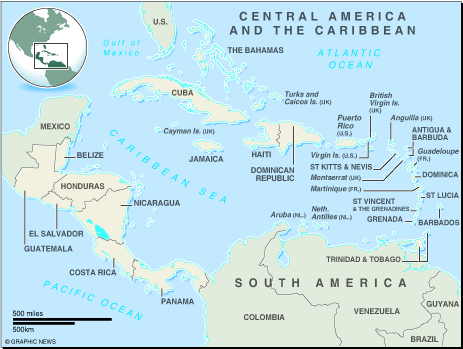Sunday Times 2
CHOGM: Our guests!
View(s):In view of the Commonwealth Summit this month, the Sunday Times has been carrying the profiles of world leaders who will be here for the biggest conference hosted by Sri Lanka since the Non-Aligned summit in 1976. We began with the African continent and today in addition to the leaders from the African continent, we also feature the profiles of the leaders of the Caribbean states. These profiles are based on material obtained from the BBC, wikipedia and wire services.
Kamla Persad-Bissessar,Prime Minister of Trinidad and Tobago
Kamla Persad-Bissessar – born on April 22, 1952 — became Trinidad and Tobago’s first female prime minister when her People’s Partnership coalition won a landslide victory in elections in May 2010.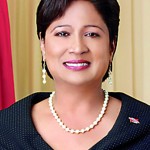
Persad-Bissessar, a former attorney general, pledged to bring transparency and accountability to all areas of government, while maintaining critical policies to ensure economic stability in the energy-rich nation.
In November 2011, the year in which she was afflicted with dengue fever, security forces foiled a plot to assassinate her and members of her cabinet.
She blamed the alleged plot on criminals seeking revenge for her decision to impose a state of emergency in response to a surge in violent crime linked to drugs gangs.
Persad-Bissessar attended the University of the West Indies, Norwood Technical College (England), and the Hugh Wooding Law School. She was awarded a B.A. (Hons.), a Diploma in Education, a B.A. of Laws (Hons.) and a Legal Education Certificate. In 2006 she obtained an Executive Masters in Business Administration (EMBA) from the Arthur Lok Jack Graduate School of Business, Trinidad.
She says, “I am baptised in the Baptist faith. I have no specific church as such. I am of both the Hindu and the Baptist faiths.”
Country facts
-Full name: Republic of Trinidad and Tobago
-Population: 1.3 million (UN, 2012)
-Capital: Port of Spain
-Area: 5,128 sq km (1,980 sq miles)
-Major language: English
-Major religions: Christianity, Hinduism, Islam
-Life expectancy: 67 years (men), 74 years (women) (UN)
-Main exports: Petroleum and petroleum products, natural gas, chemicals
-GNI per capita: US $15,840 (World Bank, 2010)
Ralph Gonsalves, Prime Minister of Saint Vincent and the Grenadines
Known by many Vincentians as “Comrade Ralph”, Gonsalves and his Unity Labour Party (ULP) won a third straight term in December 2010, in a narrow victory over the opposition New Democratic Party.
The prime minister said he was best suited to lead efforts to recover from the global economic slump. He cited his efforts to reduce poverty and improve access to education.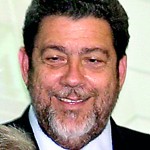
Under Gonsalves, St Vincent and the Grenadines has forged deeper ties with international partners such as Venezuela, Cuba and Iran.
In 2009, voters rejected a referendum proposal to replace the British monarch as head of state with a president elected by parliament by a 57%-43% margin.
Gonsalves was born on August 8, 1946 and practised as a lawyer. Gonsalves completed a bachelor’s degree in economics and a master’s degree in government from the University of the West Indies. In 1974 he completed a PhD in government at the University of Manchester.
Gonsalves is married to Eloise Harris. He has three sons, Camillo, Adam and Storm, and two daughters, Isis and Soleil. He has fathered another child out of wedlock. There have been several allegations of sexual misconduct against Gonsalves. In 2008, a police woman and a human rights lawyer accused Gonsavles of sexually assaulting them.
Country profile
-Full name: Saint Vincent and the Grenadines
-Population: 109,000 (UN, 2012)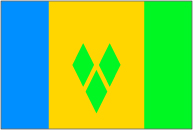
-Capital and largest 4city: Kingstown
-Area: 389 sq km (150 sq miles)
-Major languages: English
-Major religion: Christianity
-Life expectancy: 70 years (men), 75 years (women) (UN)
-Main exports: Bananas, arrowroot (starch), nutmeg, mace, coconuts
-GNI per capita: US $6,070 (World Bank, 2011)
Kenny Anthony, Prime minister of Saint Lucia
Kenny Anthony, the leader of the St. Lucia Labour Party (SLP), took office in December 2011 following a general election victory.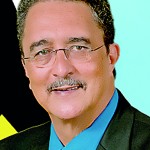
At his swearing-in, Anthony – born on January 8, 1951 — warned St Lucians of a “difficult and challenging” road ahead and said no single political party could manage the island’s affairs alone.
He pledged to boost the economy, reduce crime and improve the prospects for young people.
Kenny Anthony also served as prime minister between 1997 and 2006.
Anthony is a graduate of the University of the West Indies and the University of Birmingham. He was a member of the secretariat of the Caribbean Community (CARICOM) from March 1995[1] until he was elected leader of the Labour Party.
Anthony led St. Lucia to record development in tourism, infrastructure and general economic development. However, imbalances in the economic development, disenfranchisement and raising crime levels are challenges his administration had difficulty to tackle.
Country facts
-Full name: Saint Lucia
-Population: 176,000 (UN, 2011)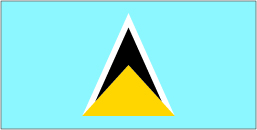
-Capital: Castries
-Major languages: English (official), French patois
-Major religion: Christianity
-Life expectancy: 72 years (men), 78 years (women) (UN)
-Main exports: Bananas, clothing, cocoa, vegetables, fruits, coconut oil
-GNI per capita: US $6,680 (World Bank, 2011)
Keith Claudius Mitchell, Prime Minister of Grenada
Keith Claudius Mitchell (born November 12, 1946) has been Prime Minister of Grenada since February this year; he also served as Prime Minister from 1995 to 2008. He is currently leader of the New National Party (NNP) and was Leader of the Opposition in Parliament from 2008 to 2013.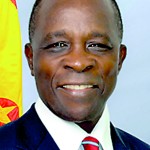
Mitchell graduated from the University of the West Indies with a Bachelor of Science degree in mathematics and chemistry in 1971. He gained a master’s degree from Howard University in 1975 and a doctorate in mathematics and statistics from American University in 1979.
Grenada made world headlines in 1983 when a split in the governing left-wing party led to the overthrow and execution of the country’s charismatic leader, Maurice Bishop, and provided the pretext for a US invasion of the islands.
Prime Minister Keith Mitchell said last Friday that the island was eternally grateful to the US for toppling a post-coup military government
His remarks came as US veterans joined Grenada residents to celebrate the 30th anniversary of the US invasion, which was dubbed “Urgent Fury”. The Grenadians commemorate the action with a national holiday known as “Thanksgiving Day.”
Country facts
-Full name: Grenada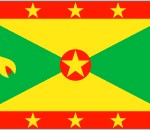
-Population: 105,000 (UN, 2011)
-Capital: Saint George’s
-Area: 344 sq km (133 sq miles)
-Major languages: English (official), French patois
-Major religion: Christianity
-Life expectancy: 74 years (men), 78 years (women) (UN)
-Main exports: Nutmeg, bananas, cocoa, fruit and vegetables, clothing, mace
-GNI per capita: US $6,930 (World Bank, 2010)
Roosevelt Skerrit, Prime minister of Dominica
Campaigning on a pledge to increase the minimum wage and attract foreign investment, Roosevelt Skerrit and his Dominica Labour Party were re-elected by a landslide in December 2009.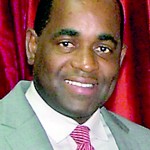
A former education minister, Mr Skerrit took office as Dominica’s youngest prime minister two days after the sudden death of his predecessor, Pierre Charles, in January 2004.
He inherited the challenge of boosting Dominica’s sluggish economy, which relies heavily on tourism and banana exports.
In 2004, Skerrit’s government cut diplomatic relations with Taiwan in favour of ties with mainland China. The prime minister said Beijing had agreed to give more than $100 million in aid — equivalent to $1,500 for each Dominican.
He has also sought close ties with left-wing President Hugo Chavez’s Venezuela. In January 2008, Dominica joined ALBA, a Central and South American trade group, which was proposed by Venezuela and opposes neoliberal economic policies.
Skerrit — born on June 8, 1972 — studied English and psychology in the US before becoming a teacher and a lecturer.
Country facts
-Full name: Commonwealth of Dominica
-Population: 70,400 (UN, 2009)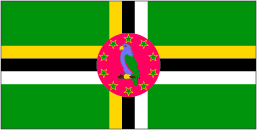
-Capital: Roseau
-Area: 751 sq km (290 sq miles)
-Major languages: English (official), French patois
-Major religion: Christianity
-Life expectancy: n/a
-Main exports: Bananas, soap, bay oil, vegetables, grapefruit, oranges
-GNI per capita: US$6,760 (World Bank, 2010)
Portia Lucretia Simpson-Miller, Prime Minister of Jamaica
Portia Lucretia Simpson-Miller, (born 12 December 1945) is leader of the People’s National Party and the seventh Prime Minister of Jamaica, currently serving since January last year. She was also prime minister from March 2006 to September 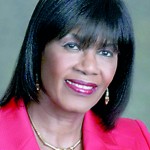 2007.
2007.
She replaced outgoing Prime Minister Patterson on March 30, 2006, becoming the first female head of government of the nation and the third in the Anglophone Caribbean, following Eugenia Charles of Dominica and Janet Jagan of Guyana.
Simpson-Miller has endorsed replacing the position of the monarchy with an elected head of state and making Jamaica a republic.
Simpson-Miller is married to Errald Miller, formerly CEO of Cable & Wireless Jamaica Ltd. In 2006 she was vested with the Jamaican Order of the Nation, giving her (and her husband) the title “The Most Honourable”.
Also known as “Sista ‘P’ or ‘Mama P’, she was ranked by Time magazine as among its “100 Most Influential Persons in the World” in 2012. She is a member of the Council of Women World Leaders, an international network of current and former female presidents and prime ministers.
Country facts
-Full name: Jamaica
-Population: 2.7 million (UN, 2011)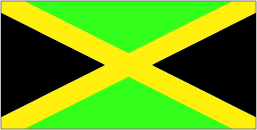
-Capital: Kingston
-Area: 10,991 sq km (4,243 sq miles)
-Major language: English (official), English patois
-Major religion: Christianity
-Life expectancy: 71 years (men), 76 years (women) (UN)
-Main exports: Bauxite, alumina, garments, sugar, bananas, rum
-GNI per capita: US $4,980 (World Bank, 2011)
Denzil Llewellyn Douglas, Prime Minister of Saint Kitts and Nevis
Denzil Llewellyn Douglas (born 14 January 1953) who became prime minister in 1995, won a fourth consecutive term in office in January 2010.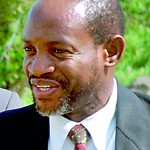
Dr. Douglas is a former high school teacher and avid sports enthusiast. He has an impressive record of community service including leadership of the 4H movement. He obtained a Bachelor of Science degree in 1977 and his medical degree with honours from the University of the West Indies in Jamaica in 1984.
Douglas has been credited with promoting tourism and combating crime, but his government failed to rejuvenate the ailing sugar industry, which the government decided to shut down in 2005.
The prime minister has said any differences between Nevis and St Kitts should be tackled by constitutional reform, rather than by a referendum on secession.
The combined population of the two territories is around 39,000.
By 2003, Nevis was home to around 17,000 offshore businesses operating under strict secrecy laws, making the islands a target for drugs traffickers and money launderers. Laws have been introduced to crack down on the problem.
Country facts
-Full name: Federation of Saint Christopher and Nevis
-Population: 39,000 (UN, 2005)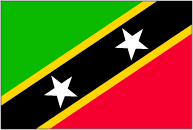
-Capital: Basseterre
-Area: 269 sq km (104 sq miles)
-Major language: English
-Major religion: Christianity
-Life expectancy: 68 years (men), 71 years (women) (UN)
-Main exports: Foodstuffs, electronics, beverages, tobacco
-GNI per capita: US $12,480 (World Bank, 2011)
Dean Barrow, Prime Minister of Belize
Dean Barrow’s United Democratic Party (UDP) won the general election in February 2008 and again in March 2012.
Barrow, born 2 March 1951, is Belize’s first black prime minister of Belize, formerly known as British Honduras. A leading 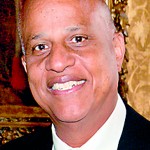 lawyer, he has appeared in several high-profile cases. He was elected to parliament in 1984 and served in senior positions in UDP governments until the PUP won a landslide in 1998. He then led the party in opposition until its victory at the polls in 2008.
lawyer, he has appeared in several high-profile cases. He was elected to parliament in 1984 and served in senior positions in UDP governments until the PUP won a landslide in 1998. He then led the party in opposition until its victory at the polls in 2008.
Belize was the UK’s last colony on the American mainland and still maintains strong ties with Britain.
It did not attain independence until 1981, when it became a Commonwealth realm with the British monarch as its head of state.
Country facts
-Full name: Belize
-Population: 318,000 (UN, 2011)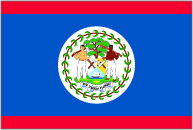
-Capital: Belmopan
-Area: 22,965 sq km (8,867 sq miles)
-Major languages: English (official), Spanish, Mayan, Garifuna (Carib), Creole
-Major religion: Christianity
-Life expectancy: 75 years (men), 78 years (women) (UN)
-Main exports: Sugar, bananas, citrus fruits, oil, clothing, fish products, molasses, wood
-GNI per capita: US$3,810 (World Bank, 2010)
Donald Ramotar, President of Guyana
Donald Ramotar, of the ruling People’s Progressive Party/Civic (PPP/C), was elected president in November 2011.
His election represented his party’s fifth straight victory, though it lost its parliamentary majority for the first time in 19 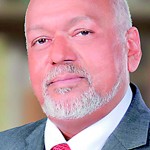 years, winning 32 out of 65 seats.
years, winning 32 out of 65 seats.
Ramotar — born on October 22, 1950 — has urged the Guyanese to set aside ethnic differences. The PPP/C gets most of its support from the Indo-Guyanese community, while the main opposition party, A Partnership for National Unity (APNU), is backed mainly by Afro-Guyanese voters.
One analyst said a hung parliament was a good thing as it would prevent one race group dominating others.
On being sworn in, Ramotar said that having a minority government – the first time that this has happened since Guyana, the only English-speaking country in South America, gained independence in 1966 – would test the maturity of Guyana’s leaders, and he called on his fellow politicians to set aside partisanship and put the interests of the country as a whole first.
An economist by training, he is married, with three children.
Country facts
-Full name: Co-operative Republic of Guyana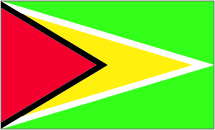
-Population: 756,000 (UN, 2011)
-Capital: Georgetown
-Area: 214,969 sq km (83,000 sq miles)
-Major languages: English, indigenous languages, Creole, Hindi, Urdu
-Major religions: Christianity, Hinduism, Islam
-Life expectancy: 67 years (men), 73 years (women) (UN)
-Main exports: Bauxite and alumina, sugar, gold, rice, shrimp, molasses, rum, timber
-GNI per capita: US$2,900 (World Bank, 2011)
Perry Gladstone Christie, Prime Minister of the Bahamas
Perry Gladstone Christie (born 21 August 1943) is a Bahamian politician who has served as Prime Minister of the Bahamas since May 2012; previously he was Prime Minister from 2002 to 2007. He is also a former athlete. He took part in 1960 West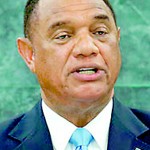 Indies Federation Games and even won a medal in the triple jump at the Central American and Caribbean Games in 1962.
Indies Federation Games and even won a medal in the triple jump at the Central American and Caribbean Games in 1962.
Christie was a student at the Eastern Senior School in New Providence, the University Tutorial College, Inner Temple in London and the University of Birmingham.
Christie has brought programmes like National Health Insurance, Urban Renewal, Mortgage Relief Program and advances to constitutional reform in fixed election dates and campaign reform.
He was re-elected as Prime Minister of the Bahamas on 7 May 2012. Critics fear that oil development could harm the ecology and tourism sector.
Country facts
-Full name: Commonwealth of the Bahamas
-Population: 347,000 (UN, 2011)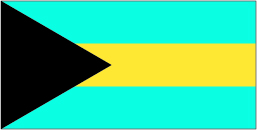
-Capital and largest city: Nassau
-Area: 13,939 sq km (5,382 sq miles)
-Major language: English
-Major religion: Christianity
-Life expectancy: 73 years (men), 79 years (women) (UN)
-Main exports: Pharmaceuticals, cement, rum, crawfish, refined petroleum products
-GNI per capita: US$21,390 (WB, 2010)
Yoweri Museveni, President of Uganda
Yoweri Museveni has been in office for a quarter of a century, having seized power at the head of a rebel army. He was 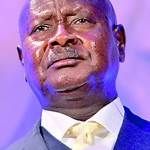 involved in the war that deposed Idi Amin Dada, ending his rule in 1979, and in the rebellion that subsequently led to the demise of the Milton Obote regime in 1985.
involved in the war that deposed Idi Amin Dada, ending his rule in 1979, and in the rebellion that subsequently led to the demise of the Milton Obote regime in 1985.
He won a fresh term in office in presidential elections in February 2011, having amended the constitution before the 2006 election to remove the previous limit on the number of terms a president could serve.
Museveni has been credited with restoring relative stability and economic growth to Uganda following years of civil war and repression under Obote and Idi Amin before him.
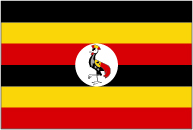 However, he has failed to stop the killings, abductions and displacement caused by the Lord’s Resistance Army group, which has been active in northern Uganda for more than two decades and spread terror to neighbouring countries.
However, he has failed to stop the killings, abductions and displacement caused by the Lord’s Resistance Army group, which has been active in northern Uganda for more than two decades and spread terror to neighbouring countries.
Museveni has appointed his son Muhoozi Kainerugaba as commander of Uganda’s special forces and there is speculation that he is grooming his son Muhoozi Kainerugaba to succeed him.
Museveni co-founded one of the rebel groups which, with the help of Tanzanian troops, ousted Idi Amin in 1979. He then formed a new rebel army which eventually seized power in 1986.
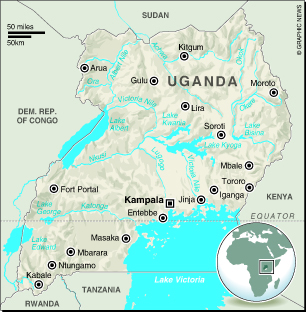
His National Resistance Movement ran Uganda as a one-party state until a referendum brought back multi-party politics in 2005. He won presidential elections in 1996, and again in 2001, 2006 and 2011.
Country facts
-Full name: Republic of Uganda
-Population: 35.6 million (UN, 2012)
-Capital: Kampala
-Area: 241,038 sq km (93,072 sq miles)
-Major languages: English (official), Swahili (official), Luganda, various Bantu and Nilotic languages
-Major religions: Christianity, Islam
-Life expectancy: 54 years (men), 55 years (women) (UN)
-Main exports: Coffee, fish and fish products, tea; tobacco, cotton, corn, beans, sesame
-GNI per capita: US $510 (World Bank, 2011)
Freundel Stuart, Prime Minister of Barbados
Freundel Jerome Stuart QC MP (born 27 April 1951) is the seventh Prime Minister of Barbados. He succeeded David 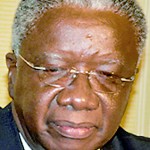 Thompson, who died on 23 October 2010 of pancreatic cancer. He is a member of the Democratic Labour Party (DLP).
Thompson, who died on 23 October 2010 of pancreatic cancer. He is a member of the Democratic Labour Party (DLP).
Stuart was born in Saint Philip, Barbados. He is single and is the father of one daughter.
An alumnus of the Christ Church Foundation School, Stuart is a graduate of the University of the West Indies and holds degrees in Political Science and Law. He is a lawyer and his practice encompasses criminal and corporate law.
Country facts
-Full name: Barbados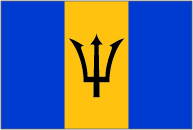
-Population: 274,000 (UN, 2011)
-Capital: Bridgetown
-Area: 430 sq km (166 sq miles)
-Major language: English (Bajan, an English-African dialect, is widely used)
-Major religion: Christianity
-Life expectancy: 74 years (men), 80 years (women) (UN)
-Main exports: Sugar and molasses, rum, other foods and beverages, chemicals, electrical components, clothing
-GNI per capita: Estimated to be high income: $12,196 or more (World Bank, 2010)
Baldwin Spencer, Prime minister of Antigua and Barbuda
Winston Baldwin Spencer (born October 8, 1948) is the Prime Minister of Antigua and Barbuda, one of the Caribbean’s most prosperous nations, thanks to its tourism industry and offshore financial services. He has been Prime Minister since March 24, 2004, when his party, the United Progressive Party (UPP), which he had led as the opposition party for several years, 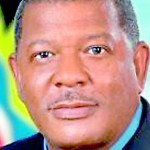 won a parliamentary election. He has also been Minister of Foreign Affairs since January 6, 2005.
won a parliamentary election. He has also been Minister of Foreign Affairs since January 6, 2005.
The 2004 win ended the political dynasty of the Bird family, which had dominated Antiguan politics for more than half a century. Spencer promised to fight corruption and added that “crimes committed against the people” would not go unpunished.
A lifelong labour activist, Baldwin Spencer was born in the working-class community of Green Bay. The premiership of Lester Bird, Spencer’s predecessor, had been dogged by allegations of bribery and of missing funds from Antigua’s health care system. Bird denied the charges.
Country facts
-Full name: Antigua and Barbuda
-Population: 88,710 (World Bank, 2010)
-Capital: St John’s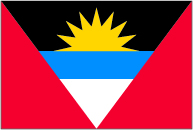
-Area: 442 sq km (170 sq miles)
-Major language: English
-Major religion: Christianity
-Life expectancy: n/a
-Exports: Garments, paint, furniture, bedding
-GNI per capita: US $10,590 (World Bank, 2010)
Jakaya Kikwete, President of Tanzania
Tanzanian President Jakaya Kikwete has been president since 2005 and is now serving his second term, having won re-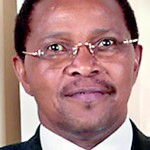 election in October 2010.
election in October 2010.
He has won much international praise for his management of the Tanzanian economy, but his political power base was undercut at the 2010 election when he won 61% of the vote on a low turnout of 42%, down from the 80% he won in 2005 on a turnout of 72%.
The main opposition Chadema party, whose candidate finished closest to Kikwete, rejected the 2010 outcome, alleging fraud.
Kikwete served as foreign minister in 1995-2005. As chairman of the African Union he played a significant role in finding a solution to the post-election chaos in neighbouring Kenya in 2007.
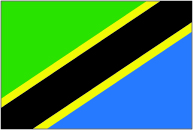 He is a veteran of the Chama Cha Mapinduzi (CCM) party, which has run Tanzania since independence, and has steered the country towards a free-market economy without totally rejecting the socialist principles of founding President Julius Nyerere.
He is a veteran of the Chama Cha Mapinduzi (CCM) party, which has run Tanzania since independence, and has steered the country towards a free-market economy without totally rejecting the socialist principles of founding President Julius Nyerere.
Kikwete, a former army officer, was born in October 1950 and is married with eight children.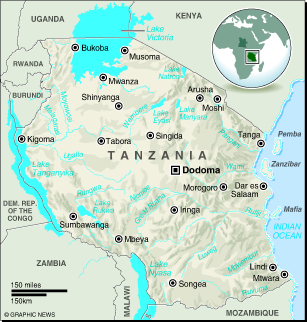
Under his presidency inflation dropped, the economy grew and Tanzania’s foreign debt was wiped. But then as now, government critics say most Tanzanians remain impoverished.
Country facts
-Full name: United Republic of Tanzania
-Population: 47.6 million (UN, 2012)
-Capital: Dodoma (official), Dar es Salaam (commercial)
-Largest city: Dar es Salaam
-Area: 945,087 sq km (364,900 sq miles)
-Major languages: English, Swahili
-Major religions: Christianity, Islam
-Life expectancy: 58 years (men), 60 years (women) (UN)
-Main exports: Gold, sisal, cloves, coffee, cotton, cashew nuts, minerals, tobacco
-GNI per capita: US $540 (World Bank, 2011)
Thomas Thabane, Prime Minister of Lesotho
Thomas Thabane heads a coalition government which ousted his predecessor after elections in May 2012.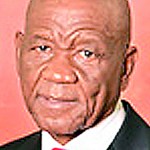
Thabane’s All Basotho Convention, the largest opposition party, teamed up with the Lesotho Congress for Democracy and the Basotho National Party (BNP) to share power and oust the unpopular Pakalitha Mosisili, who had been in power for 14 years.
Mosisili’s Democratic Congress party won the most seats, but fell short of the required majority to govern alone.
Mosisili had been in power since 1998, when post-poll wrangling led to weeks of unrest that ultimately triggered military intervention by neighbouring South Africa and Botswana to restore order.
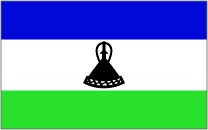 Since independence from Britain in 1966, Lesotho has undergone several military coups.
Since independence from Britain in 1966, Lesotho has undergone several military coups.
The Kingdom of Lesotho is made up mostly of highlands where many of the villages can be reached only on horseback, by foot or light aircraft.
On June 14, 2007, an assassination attempt on Thabane allegedly occurred, with gunmen firing outside his home. Several other incidents of political violence occurred at 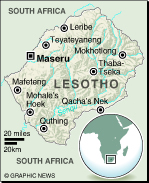 around the same time, and an indefinite curfew was imposed; it was lifted later in the month. Thabane was critical of the curfew and accused the police of being excessively harsh in enforcing it.
around the same time, and an indefinite curfew was imposed; it was lifted later in the month. Thabane was critical of the curfew and accused the police of being excessively harsh in enforcing it.
Country facts
-Full name: The Kingdom of Lesotho
-Population: 2.2 million (UN, 2012)
-Capital: Maseru
-Area: 30,355 sq km (11,720 sq miles)
-Major languages: Sesotho, English
-Major religion: Christianity
-Life expectancy: 50 years (men), 48 years (women) (UN)
-Main exports: Water, diamonds, clothing, wool, mohair, food, livestock
-GNI per capita: US $1,210 (World Bank, 2011)
Michael Chilufya Sata, President of Zambia
Before he became the President of Zambia, Michael Chilufya Sata worked as a police officer, railway man and trade unionist 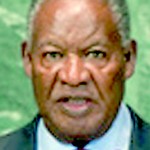 during colonial rule. He spent time in London working on the railway sweeping the platforms. Among other things, he was a porter at Victoria railway station.
during colonial rule. He spent time in London working on the railway sweeping the platforms. Among other things, he was a porter at Victoria railway station.
Following independence, he worked his way up through the rough-and-tumble rank-and-file of the ruling United National Independence Party (UNIP) to the governorship of Lusaka in 1985. As Governor, he made his mark as a man of action with a hands-on approach. He cleaned up the streets, patched roadways and built bridges in the city. Afterward he became a Member of Parliament for Kabwata constituency in Lusaka. Though once close with President Kenneth Kaunda, he became disillusioned by Kaunda’s dictatorial style and he left the UNIP to join the Movement for Multiparty Democracy (MMD) during the campaign for multi-party politics in 1991.
After Frederick Chiluba defeated Kaunda in 1991, Sata served as a minister.
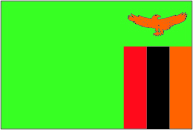 In 2001, President Chiluba nominated Levy Mwanawasa as the MMD’s presidential candidate for the 2001 election. In frustration, Sata left the MMD and set up a new party, the Patriotic Front (PF). He contested the 2001 election but did not do well-his party only won one seat in parliament.
In 2001, President Chiluba nominated Levy Mwanawasa as the MMD’s presidential candidate for the 2001 election. In frustration, Sata left the MMD and set up a new party, the Patriotic Front (PF). He contested the 2001 election but did not do well-his party only won one seat in parliament.
Sata became president on his fourth try in 2011. Although apparently showing signs of his age when he was elected at 74, Sata tapped into the grievances of the youth and the urban poor who feel left out of the impressive economic growth in Africa’s biggest copper producing nation.
The increase in copper prices since then – from around $3,000 a tonne to almost $10,000 – and the friendly tax regime have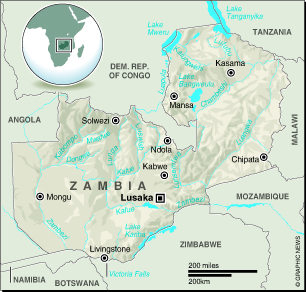 drawn a rush of foreign and investment to Zambia, particularly from China.
drawn a rush of foreign and investment to Zambia, particularly from China.
Country facts
-Full name: Republic of Zambia
-Population: 13.8 million (UN, 2012)
-Capital: Lusaka
-Area: 752,614 sq km (290,586 sq miles)
-Major language: English (official), Bemba, Lozi, Nyanja, Tonga
-Major religions: Christianity, indigenous beliefs, Hinduism, Islam
-Life expectancy: 49 years (men), 50 years (women) (UN)
-Main exports: Copper, minerals, tobacco
-GNI per capita: US $1,160 (World Bank, 2011)
Barnabas Sibusiso Dlamini, Prime Minister of Swaziland
Since 2008, Barnabas Sibusiso Dlamini (born 15 May 1942) has been the Prime Minister of Swaziland, one of the world’s last remaining absolute monarchies. He was Prime Minister from 1996 to 2003. Dlamini was Minister of Finance from 1984 to 1993. He was also an executive director of the International Monetary Fund (IMF).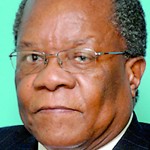
From 1996 to 2003, he was Prime Minister, and in 2003 he became a member of King Mswati III’s advisory council. Dlamini was a candidate, backed by the Swazi government, for the position of Chairperson of the African Union Commission in early 2008. The government withdrew his candidacy out of solidarity with the Southern African Development Community (SADC) so that SADC could present a single candidate.
Following the September 2008 parliamentary election, Dlamini was reappointed as Prime Minister by Mswati III on 16 October 2008. Jan Sithole, the Secretary-General of the Swaziland Federation of Trade Unions, was 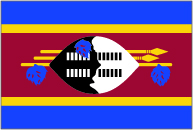 critical of the appointment, saying that Dlamini worked to “suppress political organisations and advance the strong rule of the monarchy” during his earlier period as Prime Minister; he also accused Dlamini of “strong-hand tactics and lack of respect for the rule of law”. Opposition leader Mario Masuku, the President of the People’s United Democratic Movement, said that Dlamini “was not appointed on merit but on his level of allegiance to the king”. Dlamini was sworn in by Chief Justice Richard Banda on 23 October 2008. He took the oath of office both in English and in Swazi.
critical of the appointment, saying that Dlamini worked to “suppress political organisations and advance the strong rule of the monarchy” during his earlier period as Prime Minister; he also accused Dlamini of “strong-hand tactics and lack of respect for the rule of law”. Opposition leader Mario Masuku, the President of the People’s United Democratic Movement, said that Dlamini “was not appointed on merit but on his level of allegiance to the king”. Dlamini was sworn in by Chief Justice Richard Banda on 23 October 2008. He took the oath of office both in English and in Swazi.
Country facts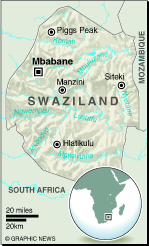
-Full name: The Kingdom of Swaziland
-Population: 1.2 million (UN, 2012)
-Capital: Mbabane
-Area: 17,364 sq km (6,704 sq miles)
-Major languages: Swazi, English (both official)
-Major religions: Christianity, indigenous beliefs
-Life expectancy: 50 years (men), 49 years (women) (UN)
-Main exports: Sugar, wood pulp, minerals
-GNI per capita: US $3,470 (World Bank, 2011)
